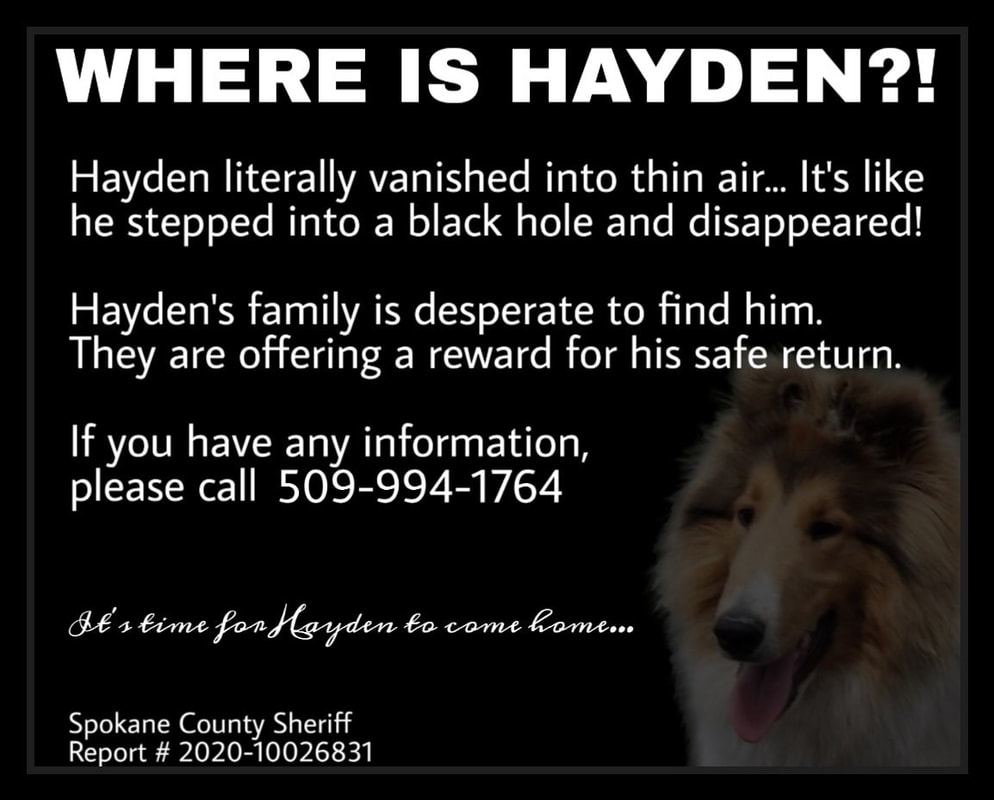There is NOTHING worse than the loss of a family member!
If you wish to post information about a missing or stolen collie OR if you have information about a missing or stolen collie
PLEASE contact US at: "GlenelgCollies@gmail.com"
|
IF YOUR PUP GOES MISSING
Do not waste any time if your dog is lost in starting the search. Don't chase, rather walk casually the opposite direction. Chasing will force the dog to run away. Don't call the dog's name. A dog in panic mode will run away and hide. Instead, look the other way and act like you're ignoring him. Speak in a calm voice, look the other way. |
BEFORE YOUR DOG GOES MISSING
The American Humane Association estimates over 10 million dogs and cats are lost or stolen in the U.S. every year. One in three pets will become lost at some point during their life. Here are the precautions to take to decrease the chance your dog gets lost or stolen and increase the chances he or she is recovered if he or she does become lost or stolen: 1. Preparation: Fireworks, squirrels, rabbits, a sudden noise like a car backfiring...anything can be an opportunity for your dog to run off and play or be scared off and run. AND, once they stop running what are they going to do? Knowing that the possibility exists means you can be better prepared. 2. GPS Tracking Collar: One of the best investments you can make, especially if you're an avid hiker or you travel extensively. 3. Identification Tag: Keep the tags current with UP-TO-DATE INFORMATION!! If you're moving, list a friend or relative's number on the tag until you get situated. For AKC registered dogs you can use the registration number which will connect to all the information on file. My dogs are registered with AKC ReUnite and the phone number is listed on the tag. 4. Martingale Collar: A flat collar is so easy to back out of and slip off. A Martingale Collar, however, especially the ones with the chain rather than the fabric, cannot get loose. 5. Microchipping: All my puppies are microchipped before they leave my house and chips are recorded with AKCReUnite.org. Every time you go to the vet have your pup scanned to make sure the chip is where it's supposed to be.. Not all vets have a universal scanner, not all medical personnel are proficient in scanning. If your pet is lost and is placed at the shelter you may only have a short amount of time to claim him or her before they are rehomed if they can't find a microchip or any type of ID. Keep your information up-to-date! 6. Photos: Take annual clear and identifying photos of your pup from front, back, and both sides and keep the photos in an easy to get to special file. This is especially important if you are getting a puppy. 7. Security Cameras: Depending on where you live, cameras can be a good resource but remember, they can only prove something happened - they are not very effective as a preventative measure. I would just count them as one more tool. 8. Fencing: If a dog can get their head through a fence, they can get their body through. Collies, generally speaking, won't go over anything higher than a 4'-5' fence and won't dig under a fence. However, a bored dog will do anything. I'm not a fan of either electric or invisible fences. 9. Resources: IF your dog goes missing what do you do first? Have a plan. Get a checklist. Post on FB, Nextdoor, flyers, contact the shelter... The quicker you get the word out the more likely you are to get your pup back. 10. Bonding: The biggest factor in getting your dog back is the strength of your bond and the one thing that will strengthen your bond is PLAY. Play games with your dog and incorporate training with it, teach him or her to do a special trick. |

